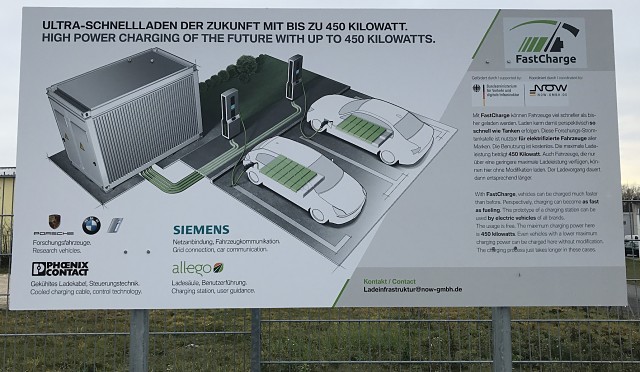BMW and Porsche challenge Tesla with 3-minute electric vehicle charging

Charging electric vehicles may soon be as quick as filling up with petrol, thanks to interim results from the “FastCharge” research project.
BMW and Porsche look set to rival Tesla in the sustainable transportation market after the pair unveiled a charging station that can power an electric vehicle (EV) to travel 100 kilometres in less than three minutes.
The ultra-fast prototype charger has a capacity of 450 kilowatts, more than triple Tesla’s superchargers.
Test vehicles using the charger, including a BMW i3, were able to get to an 80% state of charge in just 15 minutes.
This surpasses Tesla’s superchargers, which take an estimated 30 minutes to recharge.
The prototype of the charging station was inaugurated in Jettingen-Scheppach, Bavaria.
The new charging station can be used free of charge right away and is suitable for electric models of all brands with the Type 2 version of the internationally widespread Combined Charging System, which is commonly used in Europe.
The superpowered charging point was developed under a “FastCharge” research project run by an industry consortium and spearheaded by BMW.
The other members of the project include GmbH, Phoenix Contact E-Mobility GmbH, Dr. Ing. h.c. F. Porsche and Siemens.
Charging times key to lifting demand
Fast charging technology is widely considered to be a critical factor in bolstering the consumer appeal of electric cars, and more broadly, sustainable transportation.
Industry research has shown that it’s not the vehicle itself that stops people from making the leap to electric motoring – rather, it’s the uncertainty about charging durations and distance delivered per full charge that holds them back.
BMW said fast and convenient charging would enhance the appeal of electromobility.

The “FastCharge” research project has received €7.8 million (A$12.3m) in funding from the German Federal Ministry of Transport and Digital Infrastructure.
While the world of battery-operated cars is currently dominated by market-leader Tesla, established automobile manufacturers such as BMW and Porsche are keen to carve out a position in the growing market.
The Porsche research vehicle with a net battery capacity of about 90kWh achieved a charging capacity of more than 400kWh, thereby allowing charging times of less than three minutes for the first 100km of range.
Meanwhile, the new Porsche Taycan model, due out early 2019, can reportedly travel 400km on a 20 minute charge.
As for Tesla, its current standout is the Tesla Model S, with a full charge time of less than four hours promising to deliver an approximate range of 500km.
Tesla chief executive officer Elon Musk had also denounced Porsche’s initial 350kW charging station, claiming it would degrade an electric car’s battery pack for the sake of a faster charge.
ChargePoint taps into growing EV demand
California-based EV charging company ChargePoint is readying itself for anticipated demand of EVs.
Late last month, the company successfully raised US$240 million in a Series H funding round that attracted some significant backing from investors including Chevron Technology Ventures, Quantum Energy Partners and American Electric Power.
Existing investors include BMW i Ventures, Braemar Energy Ventures, Linse Capital and Siemens.
The latest fundraising effort comes at a time when the company is undergoing significant growth, due largely in part to the growing number of automakers set to produce EVs.
While Europe is leading the charge on the roll out of EVs, numerous barriers, such as cost, have been attributed to the poor level of take-up of EVs in Australia.
A recent joint study by L.E.K. Consulting, a global management consulting firm, and Australian EV charging infrastructure company Tritium, found that while EV uptake in Australia is still in its infancy, it is growing.
“As the need for the deployment of public fast chargers is required in Australia, utilities will need to be ready to turn around new connections quickly” the report noted.
The report urged utilities to be proactive in planning for a future scenario of significant EV adoption.
